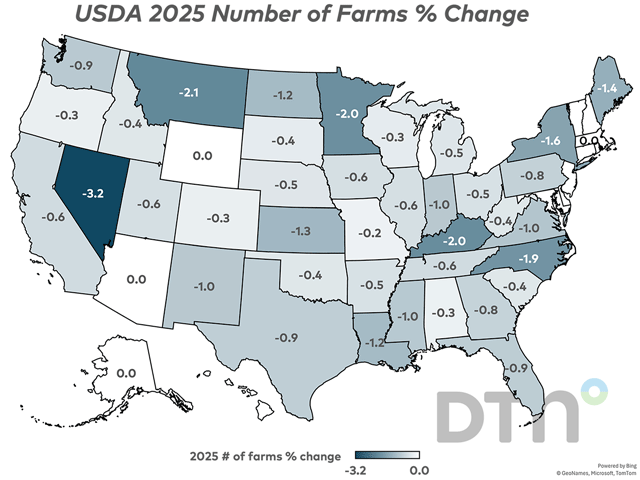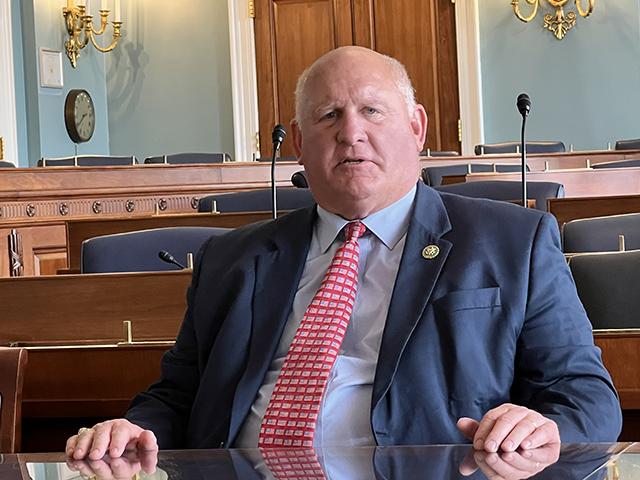House Members Pitch Farm Bill Ideas
Lawmakers Offer Support for Ag Chairman After Prostate Cancer Diagnosis
OMAHA (DTN) -- Lawmakers from both parties offered their support and prayers to House Agriculture Committee Chairman Glenn "GT" Thompson after the chairman announced Tuesday that he has been diagnosed with prostate cancer.
Thompson, 64, a Republican from Pennsylvania, posted on social media that he was diagnosed with prostate cancer after a routine physical and subsequent tests.
"While this diagnosis is a surprise, I feel well, and I will continue my work representing the people of Pennsylvania's 15th District." He added, "Anyone who's worked with me knows I am a person of faith as well as an eternal optimist, both of which will guide me as I undergo treatment. I am grateful to my medical team, my family, everyone I work with and represent in Congress."
Thompson added, "My faith in God is strong and I will tackle this head on. I appreciate both prayers and privacy during this time."
Rep Don Davis, D-North Carolina, said on behalf of Democrats on the committee, "We wish you a speedy recovery and we're praying for you."
Nineteen House members from different committees testified Wednesday in a "Member Day" hearing that allowed lawmakers to testify on some of their agricultural and nutrition priorities.
IRA DOLLARS
Thompson, during the hearing, pushed back on concerns from Democrats' opposing USDA conservation money from the Inflation Reduction Act being rolled into the farm bill. Thompson said the initial $19.5 billion has already been cut back by the Congressional Budget Office (CBO) because of budget sequestration, "and quite frankly the inability of the USDA to get that money out the door by specified time frame that's there," Thompson said.
Rolling those conservation dollars -- which were pegged for climate-smart practices -- into the farm bill would instead expand conservation funding for decades, Thompson said.
"That's why we're talking about that," he said. "We want to see what we can preserve for investments in conservation well beyond 2031, well into the future, 2050 if we do it the right way."
RESPONSE TO GAO REPORT
Thompson's office also issued a press release criticizing the Government Accountability Office (GAO) report that highlighted potential ways to cut crop insurance spending. Thompson stated the GAO report "isn't worth the paper it is printed on." Thompson said the GAO uses inconsistent performance metrics in making comparisons about profit margins for crop insurance and other lines of insurance. "Further, they completely ignore the benefits of federal crop insurance, which is one of the most successful examples of a public-private partnership in existence," Thompson said. "Farmers willingly pay significant premiums for crop insurance coverage because it provides reliable assistance when disaster strikes. This timely indemnification doesn't just benefit farmers, it bolsters rural economies by ensuring that producers can pay back their lenders, retain their employees, and get back on their feet to farm again the following season."
P[L1] D[0x0] M[300x250] OOP[F] ADUNIT[] T[]
Thompson also pointed to the criticisms of private crop insurers "amidst the ongoing debacle of USDA's implementation of disaster aid for 2022 losses. Government delivery of aid is the alternative to the public-private partnership and I don't know of a single producer that would want to make that trade or a single taxpayer that would not ultimately regret upending the system we currently have."
That statement from Thompson also was sent as Rep. Earl Blumenauer, D-Ore., was testifying about the GAO report and calling for reforms.
Blumenauer called it a "landmark report" that should demand changes in the program. He noted few specialty crop farmers participate and crop insurance largely serves a small number of larger farmers. Blumenauer pointed to the 1,341 producers with more than 900,000 a year in AGI income receiving premium subsidies.
"Most people would agree giving millionaires hundreds of thousands of dollars in heavily subsidized crop insurance is neither fair nor well targeted, yet that's precisely what the GAO found."
Blumenauer added, "This is far from a risk management tool for small family farmers."
SNAP FOCUS
Rep. Jenniffer Gonzalez-Colon, the Republican delegate from Puerto Rico, called on lawmakers to end the nutrition block-grant funding for island residents and include them in the Supplemental Nutrition Assistance Program (SNAP) like other U.S. citizens. Puerto Rican residents receive less benefits than others even though most of their food is imported and more expensive to buy. SNAP would ensure residents of Puerto Rico "are properly supported when in need of assistance to cover their dietary expenses," she said.
Rep. Brian Fitzpatrick, R-Pennsylvania, also asked to allow the purchase of hot foods for SNAP. "There will be greater flexibility for our families with this program."
Rep. Lloyd Smucker, R-Pennsylvania said there should be more incentives for healthy food choices in SNAP and he cited his support for the Women and Infant Children (WIC) program for its healthy foods. Smucker talked about the economic impact of diabetes, which costs the health care system and estimated $413 billion a year, roughly one-in-every-four health care dollars.
"We all know about the growing health care costs hear in the U.S. and the impact that has on our entire budget and economic trajectory," Smucker said. He added, "We also know nutritional eating is an important component to prevent diabetes."
Thompson and Rep. Jim McGovern, D-Mass., highlighted support for WIC and nutrition. "We need to have a greater focus on nutrition not only in the agricultural bill, but a lot of the bills that deal with health care as well," McGovern said.
OTHER MEMBER CONCERNS
Rep. Dan Newhouse, R-Wash., a third-generation farmer, called on the next farm bill to prioritize trade and expand funding for the Market Access Program and Foreign Market Development Program -- MAP and FMD. He said updates are needed to USDA's organic standards as well. Newhouse noted he supports a bill by Rep. Dusty Johnson, R-S.D., that would prevent states from imposing pesticide labeling standards that contradict EPA labels.
Rep. Rick Allen, R-Ga., also called for increasing reference prices, and allow cotton producers to enroll in the Stacked Income Protection Program (STAX) regardless of whether they are enrolled in Agricultural Risk Coverage or Price Loss Coverage (ARC or PLC). STAX was initially created as an option for farmers to use for shallow losses if they participate in PLC because STAX functions in a similar way to ARC. Allen also said farmers should have insurance coverage for supply chain issues such as a lack of inputs.
"Many farmers in my area of the country experienced financial hardships when the unusual supply chain disruptions were not covered by policies," Allen said.
Rep. Sean Casten, D-Ill., asked the Agriculture Committee to preserve the IRA dollars for conservation. He also asked lawmakers to incentivize cover crops through crop insurance programs. He pointed to policies in Iowa, Illinois, Indiana and Wisconsin that reduce farmers' premiums $5 an acre if they plant cover crops. Casten called for making that a national part of the crop insurance program. It would show how additional premium subsidies could be used for other soil health measures that reduce farmers' risks.
Rep. Ashley Hinson, R-Iowa, pointed to the costs for pork producers because of California's Proposition 12 and a similar Massachusetts law. She called for the inclusion of her bill, the Ending Agricultural Trade Suppression (EATS) Act.
"Prop 12 has the potential to disrupt the free movement of goods around the country," she said.
Rep. Victoria Spartz, R-Ind. Also called for more focus on concentration and regulation issues affecting farmers. Spartz lamented that the farm bill extension bumps up against the election next year.
"I do hope, even though it is election time, that this committee will talk about what they can do."
The full hearing can be viewed at https://www.youtube.com/…
See, "GAO: Cap Crop Insurers' Profits and Subsidies to Large Farmers," https://www.dtnpf.com/…
Also see, "Disputes About Payment Factors for ERP Disaster Aid and Funding Shortage for PARP," https://www.dtnpf.com/…
Chris Clayton can be reached at Chris.Clayton@dtn.com
Follow him on X, formerly known as Twitter, @ChrisClaytonDTN
(c) Copyright 2023 DTN, LLC. All rights reserved.




